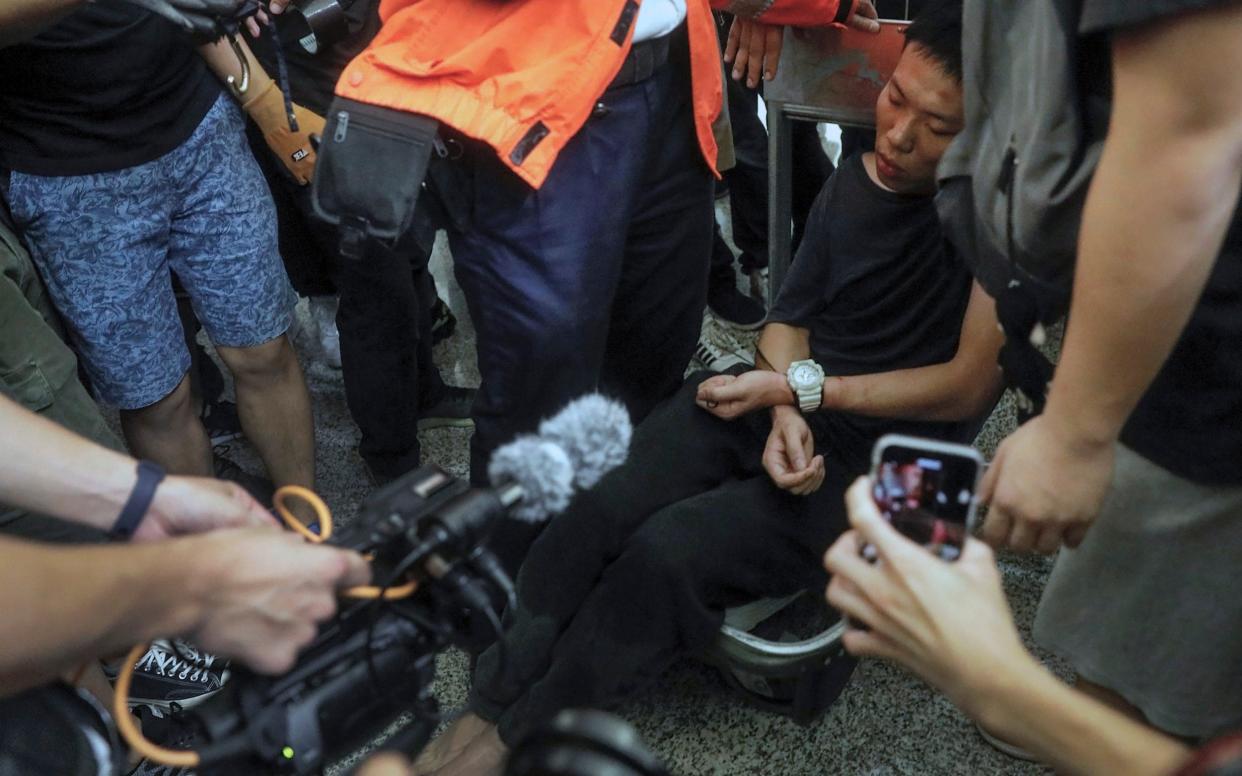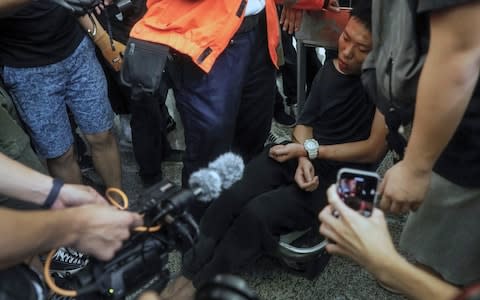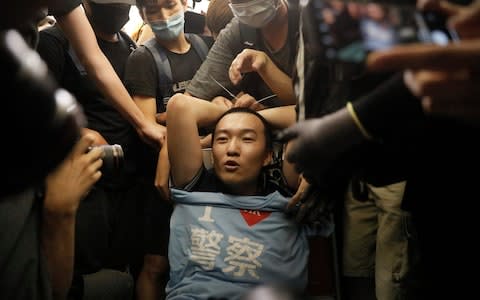Beijing 'preparing tanks at Hong Kong border', warns Trump as protesters clash with police at airport

Donald Trump warned that China was moving troops to the Hong Kong border as protesters clashed with riot police at the city's international airport for a second time on Tuesday night.
Scuffles broke out after protesters allegedly detained two men, accusing them of being undercover Chinese officials.
One of the men was bound with cable ties and appeared semi-conscious as protesters displayed his belongings on the floor. Hu Xijin, editor-in-chief of the Global Times, said the man was a reporter for the Communist Party mouthpiece newspaper.
Trouble began as a number of regular police officers entered the airport without riot gear to assist paramedics after one of the men collapsed. Protesters drove the police out of the terminal building and shortly afterwards around 50 riot police arrived.
Police used pepper spray and made five arrests as scenes briefly turned violent.
In one flashpoint, protesters cornered a police officer and started beating him with his own baton. The officer had been trying to arrest a pro-democracy protester, but was beaten back by the crowd. As he was shoved to the floor, he drew his gun. The protesters immediately leapt back.
Had he fired, the consequences for Hong Kong and its young army of activists could have been dire. But the officer held his nerve and colleagues came to his aid.

About 30 protesters remained at the airport early on Wednesday while workers scrubbed it clean of blood and debris from overnight. Check-in counters reopened to queues of weary travellers who had waited overnight for their flights.
Meanwhile, Chinese paramilitary police were assembling across the border in the city of Shenzhen for exercises.
While China has yet to threaten sending in the army - as it did against pro-democracy protesters in Beijing in 1989 - the Shenzhen exercises were a sign of its ability to crush the demonstrations, even at the cost to Hong Kong's reputation as a safe haven for business and international exchange. Images on the internet showed armored personnel carriers belonging to the People's Armed Police driving in a convoy on Monday towards the site of the exercises.
Mr Trump said in a tweet: "Our Intelligence has informed us that the Chinese Government is moving troops to the Border with Hong Kong. Everyone should be calm and safe!"
He retweeted a video purporting to show army trucks queuing in Shenzhen, the Chinese city that borders Hong Kong.
Disturbing video taken in #Shenzhen just across the boarder with #HongKong. Something extraordinarily bad is about happen. #China#HongKongProtests#Democracy#SaveHongKongpic.twitter.com/Gad5R5HVZL
— Alexandre Krauss (@AlexandreKrausz) August 12, 2019
The US president, who is embroiled in a major trade dispute with China, added: "Many are blaming me, and the United States, for the problems going on in Hong Kong. I can’t imagine why?"
Ten weeks of increasingly violent clashes between police and protesters have roiled the Asian financial hub as thousands of residents chafe at a perceived erosion of freedoms and autonomy under Chinese rule.
The United Nations High Commissioner for Human Rights urged Hong Kong to exercise restraint and investigate evidence of its forces firing tear gas at protesters in ways banned under international law.
China later rejected what it called a "wrongful statement" by the UN, saying it amounted to interference in its domestic affairs.
At a news conference in the government headquarters complex, which is fortified behind 6-foot (1.8-m) -high water-filled barricades, Hong Kong Chief Executive Carrie Lam said: "Take a minute to look at our city, our home."

Her voice cracked as she added: "Can we bear to push it into the abyss and see it smashed to pieces?"
Ms Lam’s repeated refusals to make any concessions or show sympathy towards protesters, some of whom have been injured as police shoot tear gas and rubber bullets, has only upset them more and boosted public support for the activists plunging the city into its worst political crisis in decades.
Dominic Raab, the foreign secretary, tweeted: "Concerning to see what's happening in Hong Kong and the worrying pictures of clashes between police & protesters at the airport. As I said to Carrie Lam during my call last week, we condemn the violence & encourage constructive dialogue to find a peaceful way forward."
Chris Patten, the last governor under British colonial rule, said that Hong Kong was "close to the abyss," because Ms Lam refused to withdraw a controversial extradition bill.
"I think there is a degree of frustration and anger at the government refusing to give any sensible ground at all, which probably provokes more violence," Mr Patten told BBC Radio 4's Today programme.
He urged Boris Johnson to take a firmer line with Beijing, and to put pressure on visiting National Security Advisor John Bolton for US help.
Tom Tugendhat, chairman of the foreign affairs committee, said the UK should extend citizenship rights to Hong Kong citizens.
The White House has also urged "all sides" to avoid violence in Hong Kong. Senate majority leader Mitch McConnell, a Republican, on Monday praised protesters for standing up to the Chinese Communist Party, warning that the "world is watching" for any violent crackdown by authorities.
Mr Trump earlier said he hoped no one would be killed. The crisis was a "very tricky situation," the president told reporters in New Jersey.
"I hope it works out peacefully, nobody gets hurt, nobody gets killed," he said.
China this week condemned some protesters for using dangerous tools to attack police, calling the clashes "sprouts of terrorism". They present President Xi Jinping with one of his biggest challenges since he came to power in 2012.
Hong Kong legal experts say Beijing might be paving the way to use anti-terrorism laws to try to quell the demonstrations.
The clashes at the airport followed an unprecedented airport shutdown on Monday.
Again on Tuesday, thousands of black-clad protesters jammed the terminal, chanting, singing and waving banners.
Floors and walls were covered with missives penned by activists and other artwork. Initially, the scene was peaceful as knots of protesters spoke to travellers, explaining their aims.
"Sorry for the inconvenience, we are fighting for the future of our home," read one protest banner at the airport.
"I think paralysing the airport will be effective in forcing Carrie Lam to respond to us ... it can further pressure Hong Kong's economy," said Dorothy Cheng, 17.
The weeks of protests began as opposition to a now-suspended bill that would have allowed suspects to be extradited to mainland China, but have swelled into wider calls for democracy.
Demonstrators say they are fighting the erosion of the "one country, two systems" arrangement that enshrined some autonomy for Hong Kong since China took it back from Britain in 1997.
They want Ms Lam to resign. She says she will stay.
"My responsibility goes beyond this particular range of protest," Ms Lam said on Tuesday, adding that violence had pushed the territory into a state of "panic and chaos".
As she spoke, the benchmark Hang Seng index hit a seven-month low. It shed more than 2%, dragging down markets across Asia.
Ms Lam did not respond to questions at a press briefing to clarify if she had the power to withdraw the extradition bill and satisfy a key demand made by the protesters, or if she needed Beijing's approval.
Airport authorities had earlier suspended check-in operations. Crowds of protesters continued to swell in the evening.
"Terminal operations at Hong Kong International Airport have been seriously disrupted as a result of the public assembly," the airport authority said.
Some passengers challenged protesters over the delays as tempers began to fray, while the demonstrators, using a Chinese term of encouragement, chanted, "Hong Kong people - add oil!"
Flag carrier Cathay Pacific said: "There is potential for further flight disruptions at short notice".
The airline, whose British heritage makes it a symbol of Hong Kong's colonial past, is also in a political bind.
China's civil aviation regulator demanded that the airline suspend staff who joined or backed the protests from flights in its airspace, pushing the carrier's shares past Monday's 10-year low.
Other Chinese airlines have offered passengers wanting to avoid Hong Kong a free switch to nearby destinations, such as Guangzhou, Macau, Shenzhen or Zhuhai, with the disruption sending shares in Shenzhen Airport Co Ltd surging.

